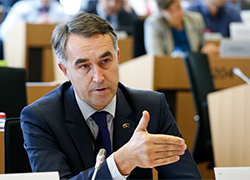Petras Auštrevičius: EU should not repeat mistakes of 2010 in relations with Lukashenka
6- 2.04.2015, 12:47
- 14,242

The dictator should not be allowed to come to Riga before the release of all political prisoners, the European MP believes.
Traditionally, Lukashenka is trying to walk a fine line amid the current geopolitical situation, gaining from it advantages for himself. To receive the dictator at the Eastern Partnership Summit in Riga without fulfillment of minimal conditions, such as release of political prisoners, would mean justification of things which are unacceptable for Europe.
It was said in an interview to charter97.org by the member of the European Parliament from Lithuania, a Liberal Petras Auštrevičius.
- Recently it was announced that the EU is going to correct its Eastern policy. What does it mean for Belarus?
- It’s true, the European Union has started to reconsider the neighbourhood policy, and in fact, the Eastern Partnership is also to become a part of reviewing this policy. The aim of this process is to evaluate the situation in a new way, to carry out a certain adjustment. As for the Eastern Partnership and specifically Belarus, we are sure that there should be even more individualization of the Eastern Partnership members.
Not all countries of the Eastern Partnership have the same priorities, ambitions and opportunities for cooperation in the proposed areas of common programmes. We are for each state choosing its own speed, place and interests.
Against the background of the current geopolitical situation Belarus probably evaluates proposals of the Eastern Partnership in a new light, as it sees the obvious opportunity for balancing between the West and the East.
- Such things had been happening always…
- Unfortunately, there is nothing new in that as usual. But the new, more complicated conditions probably make it to define more clearly and look for a more efficient and apparent balancing. The interest to this question is explained by that, and the presence of the political leader next to Eastern partners.
- Now a thaw in the relations between the EU and Belarus is observed. Has the experience of 2010 not taught the EU anything? And does the EU hope that the presidential election is going to be fair?
- A democracy often has a certain degree of political naivety, as some states are looking at the situation proceeding from their experience, their standards and so on. I think that now we are observing the same, repeating, circumstances. Lukashenka is using that, and in the run-up to the presidential election this fall he wants, so to say, a European hallmark on his election. On the other hand, one should admit that recently Belarus is not doing any moves and does not openly take the side of Russia in the conflict with Ukraine, in the issues of Crimea, the war in Ukraine. And it allows member countries of the EU to recognize that and to appraise that in their own way.
As for the election, we should be very cautious, in order not to repeat the mistakes Lukashenka could probably push us into. There are still political prisoners, and we cannot admit there are no of them. And I think that it is a signal for Lukashenka as well, that talks should be conducted, and this problem should be solved as soon as possible.
- What does the factor of Russia means in the Eastern Neighbourhood policy now?
- I think that it means just one thing. Russia has proved that the policy of the Eastern Partnership is absolutely unacceptable for it. It views the EP as a serious rival to its own neighbourhood. It is the one thing. And the other: those member-countries of the EP which had launched reforms, are dangerous for Russia, which does not want to carry out reforms, which wants to maintain status quo.
Unfortunately, I must say that Russia’s appraisals in this issue are absolutely erroneous. It sees only challenges for its existence, for its geopolitical influence. Europe does not want to compete with Russia, Europe wants more stability of the countries which are ready to cooperate on a common basis.
Is a reformed economy of Ukraine and Moldova are a threat to Russia? Is a visa-free regime with these states unfavourable for Russian citizens? I do not see any arguments, but people are referring to geopolitics here. Russia’s geopolitics at the moment is based upon irrational foundations, and unfortunately, it is a personal toy of Putin.
- Could it be said that Lukashenka would be invited to Riga Summit, which is said more and more often? And what Belarus should expect from this summit?
- I think that it is recognition for Lukashenka, to appear and be received at this summit. It is recognition and a certain level, as soon as the election is coming this autumn. He wants to use that.
And what it is for the EU, for me it is hard to say. I would like to hope that if it is going to happen, Lukashenka is to arrive in Riga at least after all political prisoners are released. It is a minimal condition.
There are also other conditions: registration of political parties, the situation with independent mass media, there are many things. I think, to receive Lukashenka in Riga without at least minimal efforts would be a justification of things which are unacceptable for Europe.









